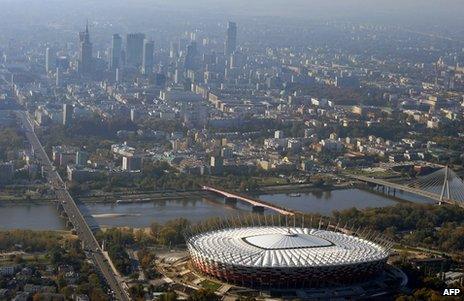Poland's continuing claim on EU investment funds
- Published

This view of Warsaw shows the national stadium built for Euro 2012
Wherever you go in the Polish capital you see and hear construction: the ring road, the metro and new motorways to ease congestion.
The A2, which connects Warsaw to Berlin, was completed earlier this year just before the Euro 2012 tournament began.
It is a practical and symbolic link between Poland and the West - putting this country back at the heart of Europe.
But infrastructure does not come cheap. Right across Poland new roads and transport networks have been built with the help of billions of euros of European Union funds - known officially as cohesion or structural funds.
"Around 1% of our GDP growth since 2008 is because of EU money," said Poland's Regional Development Minister Elzbieta Bienkowska.
"That's almost 300,000 jobs. It's an enormous change, a kind of miracle I would say."
Cohesion funds are not designed to work alone. There has to be matching investment on a national level. In Poland the result is that GDP per capita has risen from just over 40% of the EU average when it joined the Union in 2004 to nearly 70% now.
"We would probably have made this progress in about 20 years if we had been forced to go it alone, without EU development money," Mrs Bienkowska said.
But Poland feels strongly that there is more to be done. It is still catching up.
So as negotiations on the next long-term EU budget - covering the years 2014-2020 - come to a head, talk of cohesion funds being cut is causing considerable disquiet.
Exporting benefits
In a factory just south of Warsaw, surrounded by miles of orchards, workers at one of Poland's largest fruit producers, Rajpol, are packing apples for export across the continent.
In communist times, this was a state-run farm. Now it is a profitable business thanks in part to EU financial assistance.

Rajpol exports apples across Europe
The company argues that it is not just the apples that get sent across Europe, but the economic benefits too.
"All our sorting and packing equipment comes from Holland, from Italy and from France," said company representative Dominic Wozniak.
"The storage bins for apples come from Italy and Germany. About 80% of the money we get is spent in the rest of Europe, and only about 20% stays here in Poland."
And cohesion funds have not been spent on infrastructure alone. There has also been a focus on improving universities, on research and development - a focus that is due to intensify over the next few years.
It is, Polish officials argue, the best way to make the country more competitive, to strengthen and enlarge the EU's single market for the benefit of everyone.
But these are tough times and national budgets are shrinking. And the trouble with EU spending is that someone has to pay for it.
"What I say to my Polish colleagues," the UK's Europe Minister David Lidington told me on a recent visit to Warsaw, "is that all the money that is spent by the EU ultimately comes out of taxes paid by ordinary families in countries like Britain who are themselves under pretty big financial pressure."
But part of the British message is designed to be attractive to a country like Poland. Mr Lidington advocates cutting the money that richer countries, like the UK itself, receive for their poorer regions.
The idea, he said, is "that we can focus a limited, controlled EU budget much more effectively on the poorer member states".
"That means central and eastern Europe where it's really needed," he added.
Smarter spending
On the face of it, that sounds like better news for Krakow than for Cornwall, but still Britain and others want the overall budget proposal put forward by the European Commission to be sharply reduced.
Even compromise proposals submitted so far are not sufficient. Several countries say they want a real freeze in spending.
But Poland, along with a majority of member states, finds that troubling at a time when the EU is being asked to do more and more. And the government in Warsaw will resist pressure for too many cuts, particularly to cohesion funds.
"Of course we understand it," said Poland's Europe Minister, Piotr Serafin, "but the EU budget is an investment tool.
"And smart fiscal consolidation cannot be concentrated on cutting investments."
Net contributors to the budget like the UK, Sweden and the Netherlands insist that the answer is not to spend more, but to spend more wisely.
"We are not worried," Mr Serafin replied, "about a discussion on how to improve the quality of EU spending."
"We are ready to contribute to that debate, but we also expect some solidarity from our partners."
Of course, no-one can be seen to complain about better quality spending, but they may not agree on what that actually means in practice.
Disagreements about the quantity of spending are much more clear-cut.
Germany is now leading the search for further compromise, suggesting that spending should be capped at 1% of the EU's Gross National Income - more than the UK wants, but a lot less than Poland and others are hoping for.
So the budget negotiations could become very bad-tempered and there is no guarantee of success. Poland has its "red lines" just like everyone else.
When prime ministers gather in Brussels next week to try to sort it all out, David Cameron will be by no means the only one under pressure at home not to give an inch.
- Published20 December 2012